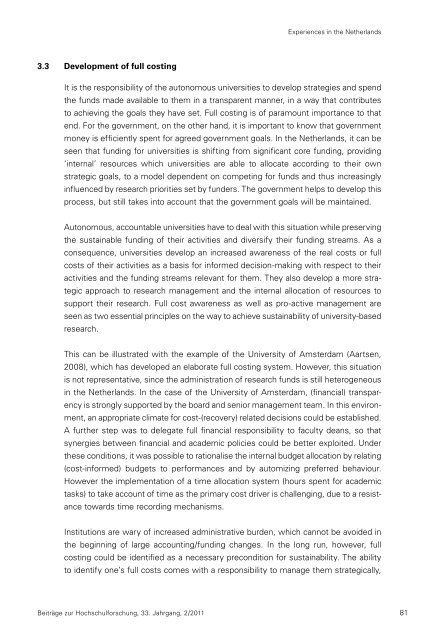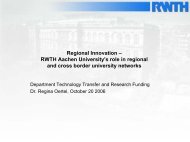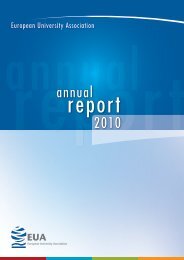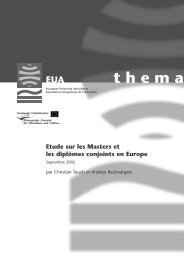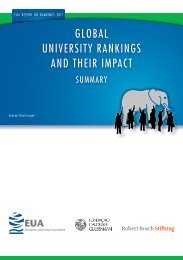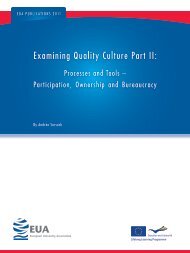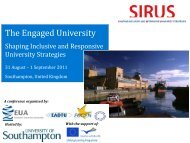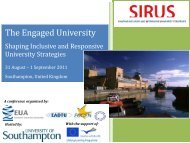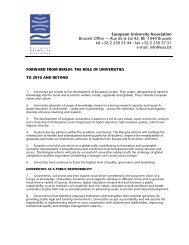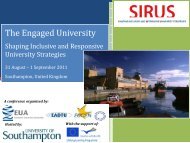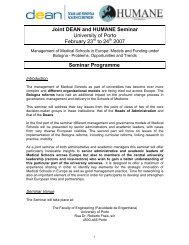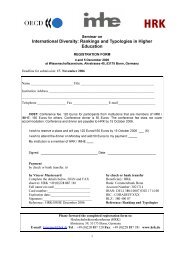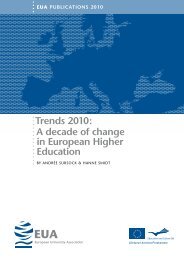Beiträge zur Hochschulforschung - European University Association
Beiträge zur Hochschulforschung - European University Association
Beiträge zur Hochschulforschung - European University Association
You also want an ePaper? Increase the reach of your titles
YUMPU automatically turns print PDFs into web optimized ePapers that Google loves.
3.3 Development of full costing<br />
Experiences in the Netherlands<br />
It is the responsibility of the autonomous universities to develop strategies and spend<br />
the funds made available to them in a transparent manner, in a way that contributes<br />
to achieving the goals they have set. Full costing is of paramount importance to that<br />
end. For the government, on the other hand, it is important to know that government<br />
money is efficiently spent for agreed government goals. In the Netherlands, it can be<br />
seen that funding for universities is shifting from significant core funding, providing<br />
‘internal’ resources which universities are able to allocate according to their own<br />
strategic goals, to a model dependent on competing for funds and thus increasingly<br />
influenced by research priorities set by funders. The government helps to develop this<br />
process, but still takes into account that the government goals will be maintained.<br />
Autonomous, accountable universities have to deal with this situation while preserving<br />
the sustainable funding of their activities and diversify their funding streams. As a<br />
consequence, universities develop an increased awareness of the real costs or full<br />
costs of their activities as a basis for informed decision-making with respect to their<br />
activities and the funding streams relevant for them. They also develop a more stra-<br />
tegic approach to research management and the internal allocation of resources to<br />
support their research. Full cost awareness as well as pro-active management are<br />
seen as two essential principles on the way to achieve sustainability of university-based<br />
research.<br />
This can be illustrated with the example of the <strong>University</strong> of Amsterdam (Aartsen,<br />
2008), which has developed an elaborate full costing system. However, this situation<br />
is not representative, since the administration of research funds is still heterogeneous<br />
in the Netherlands. In the case of the <strong>University</strong> of Amsterdam, (financial) transpar-<br />
ency is strongly supported by the board and senior management team. In this environ-<br />
ment, an appropriate climate for cost-(recovery) related decisions could be established.<br />
A further step was to delegate full financial responsibility to faculty deans, so that<br />
synergies between financial and academic policies could be better exploited. Under<br />
these conditions, it was possible to rationalise the internal budget allocation by relating<br />
(cost-informed) budgets to performances and by automizing preferred behaviour.<br />
However the implementation of a time allocation system (hours spent for academic<br />
tasks) to take account of time as the primary cost driver is challenging, due to a resist-<br />
ance towards time recording mechanisms.<br />
Institutions are wary of increased administrative burden, which cannot be avoided in<br />
the beginning of large accounting/funding changes. In the long run, however, full<br />
costing could be identified as a necessary precondition for sustainability. The ability<br />
to identify one’s full costs comes with a responsibility to manage them strategically,<br />
<strong>Beiträge</strong> <strong>zur</strong> <strong>Hochschulforschung</strong>, 33. Jahrgang, 2/2011 81


